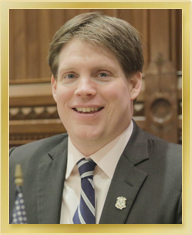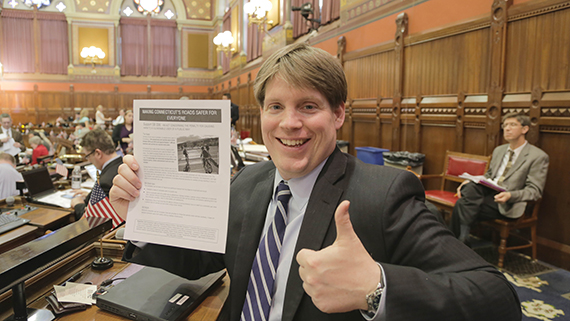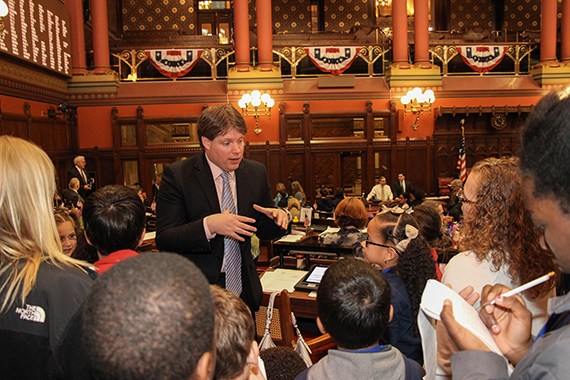
STATE REPRESENTATIVE
Roland Lemar

Serving the 96th Assembly District
Legislative Office Building, Room 4041
Hartford, CT 06106-1591
Capitol: 800-842-8267
Roland.Lemar@cga.ct.gov
GROWING THE MIDDLE CLASS
We recently increased the minimum wage to $10.10, effective by 2017. This boost in income will appear gradually in three stages with the minimum wage rising to $9.15 on January 1, 2015, $9.60 on January 2, 2016, and finally to $10.10 on January 1, 2017. The increase will raise the standard of living for thousands of hard-working families in East Haven and New Haven struggling to make ends meet. This policy also helps local small businesses, since studies show that workers earning the minimum wage spend nearly their entire paycheck with local businesses on basic living expenses, including groceries. Connecticut was the first state in the nation to pass a law to raise the minimum wage above $10 an hour, and I couldn’t have been prouder to cosponsor the bill.
This measure, together with legislation addressing job training, an increase in funding for STEP programs, the veterans training bill, and a study to create a state-sponsored IRA will allow us to grow our middle class.
ESTABLISHING THE CONNECTICUT PORT AUTHORITY
Connecticut’s three deep-water ports have long been neglected and underutilized. This year we established a Connecticut Port Authority to improve our ports - increasing trade throughout our state, growing our maritime economy with newly created jobs, and reducing the strain and congestion on our roads and bridges. The Port Authority will take advantage of Connecticut’s unique geographic position to offer niche services for freight shipping across the eastern US, and serve as an
alternative to New York and Boston. This quasi-public agency will be fully operational in October 2015 and will promote commerce and thoughtful development along our major coastal cities.
VULNERABLE USERS
This year we finally passed the “Vulnerable Users” bill which will protect pedestrians, cyclists, highway workers, and other users of our public ways.
The bill creates a maximum fine of $1,000 for a person operating a motor vehicle on a public way who fails to exercise reasonable care and causes the serious physical injury or death of a vulnerable user of a public way. The law builds on the complete streets law passed in 2009, and puts penalties on careless drivers while also holding pedestrians accountable for following the law. It’s been a tough fight and I am thrilled that pedestrians, cyclists, and other vulnerable users finally have full protections of the law. I want to thank the outstanding advocacy groups, like Elm City Cycling, for their tireless support on this issue since my first year in office.

The Vulnerable Users Bill passed 139 - 3 in the House of Representatives
and unanimously in the Senate.
EARLY CHILDHOOD EDUCATION
Early childhood education is critical to a child’s development, providing a solid foundation for future learning. This year, we formally established the Office of Early Childhood. It will administer programs and funding that affect our children from birth until elementary school. This coordinated system of care will better educate and care for our most impressionable population in an efficient and holistic way. The newly established Office of Early Childhood will develop a plan to improve access to preschool programs and achieve universal pre-kindergarten in Connecticut.
In the meantime, we have increased school readiness reimbursements and added 1,020 new preschool slots in our public schools. Our goal is clear - universal Pre-K for all of our students.

Rep. Roland Lemar meets with the East Rock Record
student reporters in the House Chamber.
TREE TRIMMING
An increase in severe storms in recent years has led to more lengthy and widespread power outages for Connecticut residents. Toppled trees and broken limbs falling on power lines are a major culprit. Although some trees must be cut down in order to preserve the integrity of the electrical grid and to prevent outages, recent tree trimming decisions seemed too heavily weighted in favor of the utilities. In response to concerns expressed by residents, we gave homeowners more say over whether trees on their property and in the public right of way can be cut down or trimmed by utility companies.
More care must be taken in deciding how much, and where, cutting needs to be done. The utilities will need to work more closely with town residents and city officials to make these decisions. The burden will rest with utility companies to demonstrate the need to trim or remove trees they believe threaten electricity distribution.
THE ENVIRONMENT
To address one of the hottest topics in energy production and environmental protection, we decided to put a three-year moratorium on the storage of fracking waste in the state.
Hydraulic fracturing (or “fracking”), where hydraulic fluid is pumped into the ground to crack rock and release gas and shale oil, has become a concern because the byproducts of this process have been found to contain harmful chemicals. Although Connecticut does not possess the natural gas that would open our state to actual fracking, we need to ensure our state’s safety from the byproducts being shipped in from other states. During a three-year moratorium, the Department of Energy and Environmental Protection will study the contents of the byproduct fluids and make regulations from these findings. We also banned the sale, manufacture, distribution, and use of any fracking product for the purpose of anti-icing, pre-wetting, or dust suppression.

Legislators attend the Bike to Work Breakfast.
